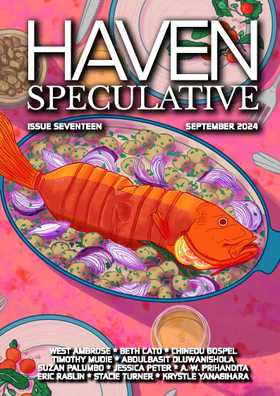FICTION
The God Who Never Sleeps Dwells Under an Inky Sea
by A. W. Prihandita in Issue Seventeen, September 2024
Affan lay sprawled on the giant seawall like he was already dead. The waves crashed against his side and sprayed over him, every drop a stab of pain to the hundred cuts he'd got when the storm swallowed him. His fishing boat was nowhere to be seen.
Disoriented though he was, he didn't need to look around to know his location. This was Jakarta Bay, inky black and smelling of rot. Affan's hand came out slimy when he dipped it in the water, as if he'd reached into the gullet of a decomposing snake and slathered his skin with its bile and venom. This giant seawall had protected Jakarta from tidal waves, but it also trapped sewage in the bay, dooming the capital to sink in its own piss and trash. Who knew how much of the toxins had seeped into his body as he lay there with open wounds? It was probably too late to do anything about it.
"I'm dead," Affan realized. Maybe not now, but soon. Strangely he felt at peace. He didn't mind letting the sea take him, if that would mean a swift, quiet end.
Across the water was the old capital, now an abandoned city of ghosts, sunken under its own weight and the mad rising sea. On its distant shore, a huddle of skyscrapers rose among mists, their neon lights dead long ago. Affan knew everything between those skyscrapers and him was also dead.
But now, something rippled the water of the bay. Not a fish, Affan was sure—no fish could live in that water.
With a sloshing noise, a child-like figure launched itself from the water and perched on the sea wall, just a handspan from Affan's feet. The figure looked male and had the silhouette of a bony frog, with knees jutting out at a sharp angle and fingers longer than any normal human's. Sewage clung to his skin, dark and lustrous like tar. Among this blackness covering his face, two rows of sharp white teeth glinted.
Affan jerked, feet seeking solid ground under him, but he was too weak to stand up and move away. "Please, ghost," be begged instead. "I'll be gone soon, I promise. Just let me take my time."
"Gone soon?" the child asked.
"Soon gone?" another echoed, dry and raspy. Affan jerked and turned. Another boy was in the water, his black eyes peering out over the surface.
"Come with us," said the half-submerged boy. His mouth was underwater, but his voice carried, and Affan gagged as he imagined opening his mouth in the sludge. "We're friends with death," the boy added.
Affan shook his head. The motion made him dizzy, and before he knew it, he'd faded away.
#
He awoke to bright lantern light and a hollow roaring in his ears. He was lying on a hard surface, but not concrete like the giant embankment. Wood, he thought. Maybe a dock. The sky was pitch black and moonless, though a million stars looked down upon him, winking like cruel jesters.
Soon the roaring in his ears resolved into words he was too weak to comprehend, and the light into a pair of long legs towering over him, clothed in tattered sweatpants under a billowing blue raincoat that looked like a surgical gown.
A familiar raspy voice spoke from somewhere over Affan's left shoulder. "He said he was dying."
"We don't say that around here," replied the person in the raincoat—a woman. When she bent down to look at him, Affan saw she had black eyes and matted black hair peeking under a half-torn hijab. There were deep gashes on the sides of her neck, but they weren't bleeding, not at all. A living corpse, Affan thought. He tried to inch away, but his muscles were stone.
"We don't say that around here," agreed the frog-like boy. "Gusti ora sare."
Disembodied voices rose around them, solemnly chanting, "Gusti ora sare."
The words sounded familiar—Javanese, Affan guessed, but though he had quite a few Javanese friends in his Sumatran homeland, he didn't understand the language. He whimpered and tried once more to move away, but the two boys held him down.
"Nurse Nurul will help you," said the frog-like boy, crouching behind Affan's right shoulder. "God doesn't sleep. Gusti ora sare."
"Gusti ora sare," the voices around them chanted. The sound blurred and warped in his head, drowned under his thumping heartbeats. There were more of these strange humans under the sea, he realized. The voices had come from the surrounding water.
The woman in the raincoat—Nurse Nurul—drew her sleeves up. On her forearms, big round octopus suckers pulsed and wriggled. Affan let out a weak scream and tried to wriggle away, but two pairs of hands held him down—the raspy boy and the frog-like boy over his shoulders.
Nurse Nurul took a knife out of her pocket and brought an arm to Affan's mouth, pressing it until one of the suckers squelched close around his lips, wet and smelly like rotten seaweed. He gagged, but the sucker sealed his mouth shut. And then a violent pull, as if it was slurping his soul out of his belly.
"Only the unclean survive here," she said. "For you to live, I have to suck all that's clean out of you. This is how you survive."
Affan's screams stuck in his throat and turned into a gurgling.
"And now, you just need another way to breathe."
She raised her knife again. Affan didn't understand what she was saying, but he understood the pain of sharp objects. The threat of torture by a knife frightened him more than death itself. He shook his head frantically. Nurse Nurul pressed her arm more firmly on his mouth.
"Don't worry," she said. "I was an actual nurse. I've assisted surgeries many times."
She brought the knife to one side of his neck and made a deliberate incision. The pain was head-splitting, punctuated by a warm burst of blood. This time he screamed so violently the sucker popped out of his mouth, but the hands that held him down remained firm. The nurse calmly turned his head and made more cuts on the other side of his neck.
"Now," she smiled when she was done, "you'll be able to breathe."
The boys who'd been holding him threw him into the sea.
#
Affan sank in thick, inky, rotten water. Chants rang around him: Gusti ora sare, Gusti ora sare. He gasped for air, which was a mistake—black slime rushed into his mouth and down his throat. His limbs twitched helplessly. He grabbed at sea waves and found no purchase.
Around him the chants echoed like a litany of prayers. He closed his eyes. Maybe their god didn't sleep, but he certainly would soon. An eternal sleep.
He felt almost grateful. At least the pain would stop.
Just then, the sea around him stirred. His eyes snapped open in surprise. A ball of jade-green light bloomed before him, and around the light, a ribbon of black water swirled and solidified into the shape of a woman, with flowing hair and an elaborate headdress crowning her.
She pulsed with a terrible power. Affan kicked and flailed, trying to swim away. Too late. The woman reached out and laid a hand on his neck, over his gashes.
He expected explosions or bone-shaking electrocution, but her touch was gentle, her face softened with pity.
I am here, she seemed to say. I still watch over you.
Power coursed from her, and now Affan too glowed. The gashes in his neck throbbed, contracting and expanding. Water rushed into them and somehow, they picked up precious air from among the slime and sewage. He took huge gulping breaths, and each one of them tasted sweet, tasted fresh, tasted like air in a sunny rain-washed morning.
You just need another way to breathe, the nurse had said. We don't say die around here.
The seawater woman was gone, but on the surface, Nurse Nurul and the others greeted him with gentle smiles. The gashes on their necks pulsed together in synchronous breathing.
When they chanted again, Affan followed them, voice full of newfound life. He understood now.
Gusti ora sare.
God never slept. Not even in the city everyone gave up on.
© 2024 A. W. Prihandita
A. W. Prihandita
Anselma Widha Prihandita (she/her) is a college writing instructor and PhD candidate in rhetoric and composition, with scholarly (and personal) interests in decolonial and transnational writing. Her most favorite job, however, is writing speculative fiction with hints of heartbreak and the personal political. She splits her time between the US West Coast, where she currently teaches and studies, and Indonesia, where she grew up and where her home remains. She attended the Odyssey workshop in 2023 on their Fresh Voices Scholarship, and the Clarion workshop in 2024 on their Octavia Butler Scholarship. Her stories are published or forthcoming in Cast of Wonders, khōréō magazine, Ghoulish Tales, Mysterion, and Fusion Fragment.





